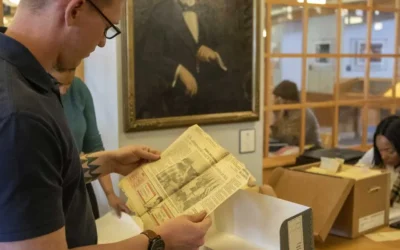Responsible Stewardship in Archival Practice
Margot Note
Archivists are the keepers of history, entrusted with the care of documents, records, and materials that witness the human experience.
As conscientious custodians, archivists pledge to engage in ethical and transparent decision-making regarding the best possible care for the materials entrusted to them. Responsible stewardship is a philosophy that guides the actions and decisions of archivists in safeguarding collective memory.
The core principles of responsible stewardship in archival practice encompass ethical decision-making, responsiveness to internal and external needs, the development of best practices, and a commitment to considering the realistic capacity for care when acquiring or deaccessioning materials.
Ethical Decision-Making
Ethical decision-making is at the heart of responsible stewardship. Archivists are bound by a robust code of ethics that places the well-being of the materials and the trust of donors and creators at the forefront of their responsibilities. They make decisions prioritizing the preservation, security, and accessibility of materials while respecting the rights and intentions of donors, creators, and stakeholders.
Transparency in decision-making is also a key component of ethical stewardship. Archivists should be open about the rationale behind their actions, whether it involves acquisition, deaccession, preservation, or access policies. Transparency builds trust and ensures stakeholders understand the reasoning behind archival decisions.
Responsiveness to Internal and External Needs
Responsible stewardship extends to considering both internal and external needs. Archivists recognize that the materials in their care are resources serving diverse user communities. They engage with these communities to understand their needs and preferences, adjusting practices and policies accordingly. Archivists should seek feedback and input from users, researchers, and other stakeholders to ensure the materials are as accessible and relevant as possible.
Developing Best Practices
The development of best practices is essential to responsible stewardship. Archivists refine their methodologies and standards based on the latest research and advances in the field. They contribute to forming best practices reflecting their archival expertise and adapting to stakeholders’ evolving needs and suggestions. These best practices encompass everything from preservation techniques to access policies and outreach efforts.
Considering Capacity
Responsible stewardship also involves considering the realistic capacity for care when making decisions about acquisition or deaccessioning. Archivists understand that acquiring additional materials beyond their ability to care for them properly can jeopardize the well-being of the entire collection. Conversely, while challenging, deaccessioning materials may be necessary to ensure the proper care of the core collection and maintain the repository’s commitment to responsible stewardship.
The decision to deaccession materials should not be taken lightly. It should be guided by a clear and transparent policy that respects ethical principles and involves stakeholders in decision-making. Deaccessioning should be done with the utmost care, ensuring that the materials transfer to a suitable repository or, if necessary, disposed of in a manner that respects their historical and cultural significance.
Responsible stewardship requires archivists to consider the ethical distribution of available resources. It is about recognizing finite resources such as storage space, funding, and personnel. Archivists must make strategic decisions about allocating these resources to ensure the proper care of materials and the fulfillment of the institutional mission of their archival organization.
These decisions should be informed by a thoughtful assessment of the repository’s priorities, goals, and available resources. Archivists must balance the acquisition of new materials with the responsibility of caring for existing collections. They evaluate the costs and benefits of various preservation strategies, outreach efforts, and access initiatives.
Responsible Management
Maintaining trustworthy relationships with creators and donors is vital to responsible stewardship. Archivists understand that these individuals and organizations have entrusted their materials to the repository with a certain level of expectation. To honor this trust, archivists must uphold their commitment to ethical practices, transparency, and responsible management of resources.
Responsible stewardship aligns with the changing needs of archival collections, user communities, and the broader field of archiving. Archivists advocate for the materials in their care, ensuring they remain accessible to future generations. Responsible stewardship is the guiding philosophy that informs all strategic discussions at every stage of the lifecycle of materials within a repository’s collection, ensuring that the past is nurtured for the benefit of the future.
Never miss another post. Subscribe today!
Similar Posts
Collaborative Archival Relationships
Collaborative projects are instrumental in showcasing how archival collections can benefit various organizational departments.
Informational, Evidential, and Intrinsic Values within Archives
Archives provide authentic, reliable information and hold values that reflect their functions and uses; informational, evidential, and intrinsic.
A Sustainable Archives
Archivists prioritize sustainable practices and policies, rooting their work in ethics of care, often preferring digital processing and preservation
Archival Branding and PR Strategies
Archivists who adopt branding and PR strategies both safeguard historical treasures and contribute to their organizations’ evolution.




Leave a Comment
Comments are reviewed and must adhere to our comments policy.
0 Comments